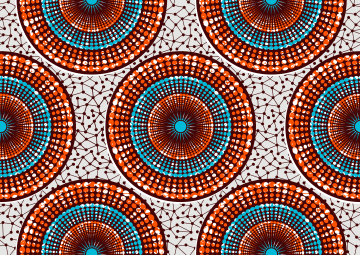
Africa’s textile industry has been experiencing increased growth in recent years, but it has come at an environmental cost due to its huge energy and water demand and use of highly polluting chemicals. Taking a more circular approach, however, provides a paradigm shift that goes beyond the current “take, make and dispose” model and focuses on a more cost-effective and sustainable production process.
This was one of the main takeaways of the In Africa for Africa: Weaving solutions for textile circularity challenges workshop organized at the World Resources Forum 2021 on 12 October 2021 by the Green Industry Platform, together with the Global Opportunities for Sustainable Development Goals (GO4SDGs) initiative and United Nations Environment Programme’s EU-funded InTex project.
The workshop, moderated by Zubeida Zwavel, executive director of the Centre for African Resource Efficiency and Sustainability (CARES) and one of the implementing partners of the InTex project, explored how retailers and small and medium-sized enterprise (SME) suppliers in Africa can better collaborate for coordinated circularity efforts to bridge the communication gaps along textile value chain.
“Manufacturing in Africa is an opportunity for growth. The onus is on us to improve local manufacturing, promote sustainable international trade and help solve textile circularity challenges,” said Isaac Maluki, CEO of Shona EPZ Limited, a Kenyan company with 600 workers producing over 300,000 units of garment per month for export mainly to the United States of America. He also emphasized the potential of the African textile industry at the local level to reduce reliance on imports, while increasing its international market share.
Yet, the challenge remains how to incentivize brands and SME suppliers to better work together on circularity when there is so much pressure to keep prices low and increase turnover.
“For local brands to flourish, we have to tackle fast fashion, which is drowning Africa‘s textile market with second-hand clothing in what is essentially dumping. Circularity will only prevail once we create a local economy for locally produced textiles,” stressed Wandia Gichuru, co-founder and CEO of Vivo Brands, a large retail fashion business that runs 17 stores throughout Kenya, and Zetu Manufacturing and ShopZetu, a multi-brand e-commerce platform.
SMEs are well placed to tap into consumer-driven demand for locally and sustainably produced textiles. This will increase a company’s competitiveness and enhance potential partnerships with brand clients. Focusing on sustainable business models and the production process will ensure greater traceability of sourcing of materials.
“Consumers have the power to inspire brands and producer SMEs to responsibly source and use raw materials for greater circularity along the textile value chains,” said Fatouma Sawadogo Maiga, national coordinator of the Ethical Fashion Initiative project in Burkina Faso, a flagship programme of the International Trade Centre connecting marginalized artisans to international fashion houses for mutual benefit.
Karfa Yacoro, director of CABES, a social enterprise in Burkina Faso encompassing around 50 local artisans producing and selling danfani fabrics made with organic cotton highlighted the opportunity organic cotton represents in Africa. “As a social enterprise working directly with local artisans producing fabrics made from organic cotton, we aspire to provide 60% of Burkina households with reusable tote bags by 2025 to reduce plastic consumption for greater material circularity.”
Key messages from the workshop included:
- Improving pan-continental collaboration between organizations supporting textile-sector SMEs on resource efficiency and sustainable business models in East and West Africa. This has the potential to support the increased development of sustainable local and regional markets to reduce reliance on imports.
- Addressing the overproduction of garments by fast fashion brands to reduce the excessive amount of second-hand clothing distorting local markets and impacting local brands. It is important that leading brands increasingly recycle and lead the way for used clothing being repurposed sustainably for raw material production. An overall paradigm shift towards producing valuable items that remain in use for a long period before being repurposed or recycled is key to move towards circularity.
- Supporting targeted capacity-building programmes for textile-sector SMEs to help take advantage of improved local market conditions. A cost-effective approach to producing textile products sustainably can drive business competitiveness.
These insights will feed directly into the recently launched I-GO initiative from the Green Industry Platform and the EU-funded InTex project.
I-GO is currently being deployed in collaboration with the GO4SDGS in several African countries. It aims to provide large numbers of SMEs with easier access to resource-efficiency support services tailored to their specific needs across different sectors.
The national components of the InTex (Innovative Business Practices and Economic Models in the Textile Value Chain) project train and provide technical assistance to African SMEs and other relevant stakeholders on eco-innovation and product environmental footprint. This helps companies to measure their impacts and address them by incorporating circularity and resilience into every aspect of their business strategy and underlying business models, operations and products.
Both of these initiatives are engaged in supporting the uptake of circularity measures for SMEs, including in the textile sector in Africa.
The workshop was part of the Circular Economy conference track of the World Resources Forum 2021, co-hosted by the Ministry for Environment, Science, Technology and Innovation of Ghana and the Swiss Federal Office for the Environment. The theme of this year’s meeting was fostering a multi-stakeholder dialogue around "A Green Deal for Sustainable Resources".
